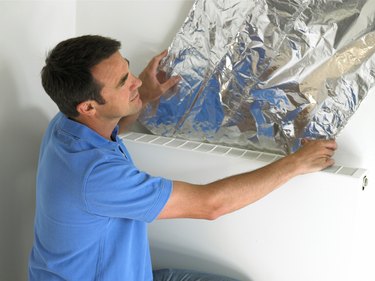Things You'll Need
Tape measure
Duct wrap
Utility knife
Foil tape
Dust mask

Duct wrap is an insulation material made of fiberglass. One side of the wrap has a foil vapor barrier that protects the insulation from damage. Since heating and cooling ducts are made of metal, they quickly conduct heat out of the duct when heating and into the duct when cooling. This creates significant inefficiencies in your system which will be reflected in your energy bill. Duct wrap also serves to prevent your ducts from sweating when you run your air conditioning.
Step 1
Measure each side of your duct work. Add these measurements together to come up with the perimeter. The perimeter in this case is the distance all the way around the duct work.
Video of the Day
Step 2
Roll out your insulation on the floor or another flat surface. Measure out the distance you calculated in step 1. Add about 4 to 6 inches to this measurement. This allows for the thickness of the insulation and creates an overlap so you can tape your insulation down tightly.
Step 3
Cut through the insulation and foil layer with your utility knife. Use a sharp blade to prevent ripping or shredding of the insulation.
Step 4
Drape the duct wrap insulation blanket around the duct. Tape one end down to the duct with foil tape and pull the other end tightly. Notice that you will have a few inches of overlap in the insulation. Tape this end down tightly to the insulation.
Step 5
Measure and cut another piece of insulation. Secure this to the duct in the same fashion as you did the first piece of insulation. Tape the seam around the entire duct where the two pieces of insulation meet. Continue to cut and fasten insulation to the duct until it is completely wrapped.
Warning
Dust masks should always be worn when working with insulation. The fiberglass fibers are lung irritants.
Video of the Day